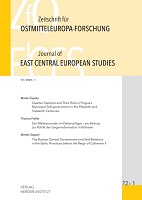Quarter Captains and Their Role in Prague’s Municipal: Self-government in the Fifteenth and Sixteenth Centuries
Quarter Captains and Their Role in Prague’s Municipal: Self-government in the Fifteenth and Sixteenth Centuries
Author(s): Martin ČapskýSubject(s): Public Administration, Political history, Government/Political systems, 16th Century, 17th Century, Fiscal Politics / Budgeting
Published by: Verlag Herder-Institut
Keywords: Prague; self-government; urban administration; town council;
Summary/Abstract: In the presented study, the author deals with the question of whether the division of late medieval Prague (or the towns of Prague) into quarters played a political role in addition to its administrative function of tax collection and organization of the militia. In other words, the author seeks to determine whether Prague’s neighborhoods also played a political role, which was the case in several western cities. In studying Prague’s roots, the author became interested in whether neighborhoods served to represent local communities vis-à-vis the town council. The oldest quarter regulations from Bohemian towns date from the beginning of the sixteenth century. The provisions of these regulations mainly concern fire protection, but two other important aspects also appear. The quarter captains also performed the task of social supervision in urban households, and their responsibility was to the burgomaster and not to the quarter’s community. Therefore, in the study, the author works with the hypothesis that quarter self-government in Central Europe was not representative of the residents of the quarter being in communication with the town council, but rather a tool through which the town council gained blanket control over the town’s spaces. A more intensive use of quarter organization headed by captains as well as sergeants and corporals (depending on the number of houses) enabled town councils to change political communication. A functioning quarter administrative network could better fulfil the will of the council than the permanent negotiation for consensus with guilds and other institutionalized communities. Similar terminology, familiar from the more western cities of the empire, thus, in fact, denoted an administrative structure which functioned in a significantly different manner.
Journal: Zeitschrift für Ostmitteleuropa-Forschung
- Issue Year: 72/2023
- Issue No: 1
- Page Range: 1-26
- Page Count: 26
- Language: English

